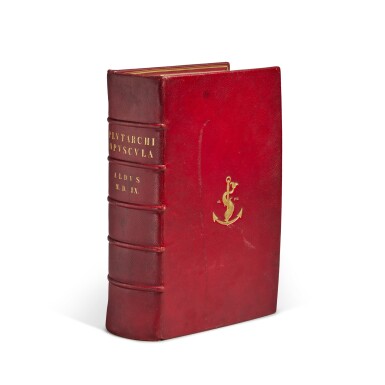
Plutarchus, Opuscula, Venice, Aldo Manuzio & Andrea Torresano, March 1509, nineteenth-century red morocco
Session begins in
June 25, 02:00 PM GMT
Estimate
12,000 - 18,000 USD
Bid
8,500 USD
Lot Details
Description
Plutarchus. Plutarchi Opuscula. LXXXXII. Index moralium omnium & eorum quae in ipsis tractantur habetur hoc quaternione, numerus autem arithmeticus remittit ad semipaginam ubi tractantur singula. Venice: Aldo Manuzio & Andrea Torresano, March 1509
First edition, heavy paper copy, of a foundation text of ancient scholarship and ethics, held in the highest esteem by generations of Western thinkers, Montaigne above all.
Plutarch (ca. 46-120 AD) was the most acclaimed Greek intellectual of his age. Born into a wealthy Boeotian family, he served as priest of Apollo in Delphi. His parallel biographies of famous Greek and Roman personalities won him long-lasting fame. His short essays are gathered under the title of Moralia, and include major and minor philosophical questions (most famously, whether the hen or the egg came first), religious, political, and historical dissertations, as well as lighter interludes including the dialogue between Odysseus and one of the wretched men turned by Circe into pigs.
The relatively late appearance into print of the Moralia was likely due to the difficulty of establishing a good Greek text. The edition, planned by Aldo since 1506, was eventually accomplished with the help of Erasmus, Girolamo Aleandro, and the Greek scholar and later printer Demetrios Ducas, who was in the end the primary editor. In his preface, Ducas admits that the 13th-century manuscript he had mainly relied on was so corrupt that he resolved to leave many passages as unintelligible as they originally stood. In the dedication to Jacopo Antiquario, Aldo recollects his short stay in Milan, while he is hailed as the "saviour of the Greek language" at the very beginning of Ducas’ Greek preface.
The Clark copy.
8vo (282 x 175 mm). Greek type, 46 lines plus headline. collation: +8 a-z8 &8 aa-zz8 aaa-sss8 ttt6: 534 leaves. Woodcut Aldine device on title-page and final verso. (A few stray spots and stains, worming to last few leaves repaired.)
binding: Nineteenth-century red morocco over thick wooden boards (295 x 195 mm), gilt Aldine device on covers, edges gilt, turn-ins ruled in gilt and blind with gilt rosettes at corners. (Extremities rubbed, scuffs, offsetting of turn-ins onto endleaves.)
provenance: Charles W. Clark (1871-1933); The Library of Charles W. Clark (San Francisco 1914), I, p. 99 — Rosenbach Company, Philadelphia. acquisition: Purchased from John Fleming, New York, 1968. references: UCLA 101; Renouard 55/1; Edit16 37429; USTC 849950
You May Also Like




![Plinius Caecilius Secundus, Nat. hist. libros locupletior, Venice, [Heirs of Aldo Manuzio & Heirs of Andrea Torresano], 1538, dark brown Parisian calf by Etienne Roffet (ca. 1539-1540) for François I, King of France](https://dam.sothebys.com/dam/image/lot/57c62633-c17e-498e-9c52-d07266a9413b/primary/extra_small)





![Vitruvius, De architectura libri decem, [Lyon, Lucimborgo da Gabiano, 1523], sixteenth-century vellum over pasteboards](https://dam.sothebys.com/dam/image/lot/8a9ef3f8-ee22-439c-ba48-64799e557c1a/primary/extra_small)